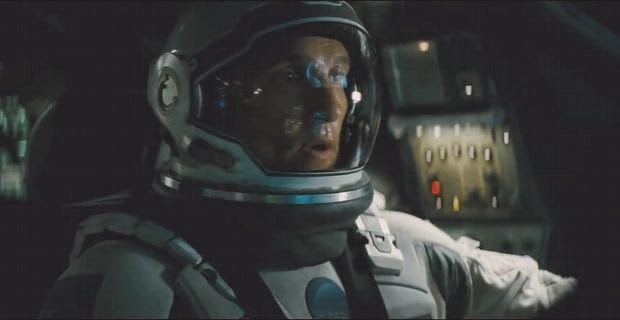In the not too distant future, the
inhabitants of planet Earth are faced with an alarming shortage of food and
resources, while an increasing number of sandstorms threaten to make life even
more unsustainable. In a bid to find a new world that the human race can make
their home, a small team of astronauts board NASA’s last remaining spaceship
and set off on a pioneering mission, as they try to explore a new galaxy via a
mysterious wormhole.
Ever been in the presence of
someone who got so caught up in explaining a theory they had just stumbled
upon, that they lost you halfway through their earnest monologue overflowing
with scientific jargon? That’s a big fat metaphor that aptly summarises Interstellar, one of the smartest
blockbusters to ever grace our screens yet also an unexpectedly dissatisfying
movie-going experience.
You certainly can’t fault the
Nolan brothers (Christopher directing, his brother Jonathan penning the
screenplay) for a lack of effort. From the moment Michael Caine and Anne
Hathaway’s scientists launch into detailed explanations on wormholes, binary
coordinates and gravitational waves, it becomes clear the two filmmakers have
done their homework. Problem is, they probably got into it a little too much.
It’s never a good sign when characters in science fiction films need to explain
a convoluted narrative with the aid of a whiteboard (Emmett Brown’s timeline
diagram in Back To The Future Part II
being the rare exception) - Interstellar
resorts to this device not once, but three
times, clearly suggesting that the Nolans have bitten off more than they can
chew.
That’s not to say that Interstellar should’ve been dumbed down
– if anything, it’s got the opposite problem of the Transformers movies, which could do with more brains to go with all
the brawn. But by cramming in so much scientific exposition, the Nolans often
risk alienating their audience completely, when there’s clearly a very powerful
human component to the plot that is far too often overlooked.
 At its core, Interstellar is the story about a man trying to get home to his
family, both in the literal and metaphorical sense. In the hands of Matthew
McConaughey, who’s currently experiencing an astounding career renaissance, the
scenes in which lead astronaut Cooper is either breaking away from his daughter
as he’s leaving Earth or watching his kids rapidly grow up before his eyes on
video logs transmitted to the spaceship, pack an undeniable emotional punch. If
there’s anything keeping this space odyssey grounded, it’s McConaughey’s
bravura performance, which inevitably overshadows all the supporting players,
including fellow acting heavyweight in the making, Jessica Chastain.
At its core, Interstellar is the story about a man trying to get home to his
family, both in the literal and metaphorical sense. In the hands of Matthew
McConaughey, who’s currently experiencing an astounding career renaissance, the
scenes in which lead astronaut Cooper is either breaking away from his daughter
as he’s leaving Earth or watching his kids rapidly grow up before his eyes on
video logs transmitted to the spaceship, pack an undeniable emotional punch. If
there’s anything keeping this space odyssey grounded, it’s McConaughey’s
bravura performance, which inevitably overshadows all the supporting players,
including fellow acting heavyweight in the making, Jessica Chastain.
Also worth mentioning is that,
despite the afore-mentioned misgivings with the way he handles his subject
matter, Christopher Nolan remains nonetheless the most gifted mainstream
director currently working in Hollywood, proving once again that he’s just as adroit
at delivering a monumental set-piece (superbly conveying the right balance of
dread and excitement that one would feel at entering a black hole for the first
time) or handling the more quietly powerful moments, such as the scene in which
a stranded astronaut breaks down after seeing another human being for the first
time in years.
But then Christopher’s studies on
physics and relativity kick in again, resulting in a final act twist that is
likely to confound casual viewers and infuriate astronomy students. It’s
daring, it’s different, it’s definitely something new that we haven’t been
exposed to before on the silver screen, but there will be some head scratching.
Worst of all, it comes neatly bow-tied with a “love conquers all” message which
is seriously out of place with all the scientific babble we’ve had to endure
until this point.
Is Interstellar a bad film? Far from it, it would actually be nice to
see more blockbusters with this much drive and originality. But the end product
certainly doesn’t live up to the audience’s expectation and, quite possibly,
the Nolans’ ambition.
3/5

No comments:
Post a Comment